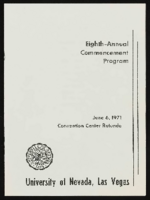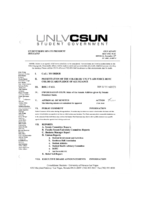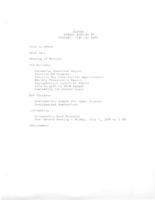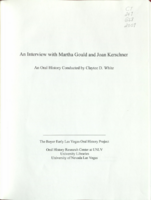Search the Special Collections and Archives Portal
Search Results
Audio clips from interview with Dr. Ed Goldman, April 4, 2016
Date
Archival Collection
Description
In these audio clips, Dr. Goldman recalls attending services as Temple Beth Sholom, and the effort to get more minorities, including Jews, hired in Clark County School District.
Sound

Transcript of interview with Eva Garcia Mendoza by Elsa Lopez and Barbara Tabach, September 25, 2018
Date
Archival Collection
Description
On the corner of 7th street and Clark, and beside the tennis courts of Las Vegas Academy, stands the law office of attorney Eva Garcia Mendoza. Eva has worked in her office since 1982, and in this time she has helped the Las Vegas community work through civil and immigration cases besides aiding in a myriad of other ways. Eva Garcia Mendoza was born in 1950, in the town of McAllen, TX-an environment that perpetuated hatred of Mexican Americans. Eva recalls the racism she endured; for instance, being spanked if she spoke Spanish in school, and her family facing job discrimination because of her skin color or her last name. Being an ethnic and financial minority was difficult, and Eva remembers nights as a child when she would cry herself to sleep. Eva showed resilience in the face of adversity as she states, “you rise to the level of your teachers’ expectations.” With the encouragement of her band professor, Dr. L.M Snavely, she began higher education at Pan American College. She moved to Las Vegas in 1971 and began to work before being accepted at UNLV to study Spanish literature. She graduated in the class of 1973. In 1975, Eva applied to become a court interpreter, a decision that would drastically change the trajectory of her career. She earned the coveted position and began to work beside Judge John Mendoza who was the first Latino elected to public office in the state of Nevada. Several years later John and Eva would wed. Judge Mendoza passed away in 2011. Eva talks about how extraordinary his legacy is-from his professional achievements to a story about his v football days and the 1944 Dream Team, this true story even piqued the interest of Hollywood writers. Through her work, Eva began to notice how she was more than qualified to become a lawyer herself, so she applied and gained a full ride scholarship to the Law School of San Diego University. Eva describes the struggles of attending school in San Diego while her spouse and children were home in Las Vegas. Despite the financial difficulties, being one of few minority students, and becoming pregnant her second year, Eva was able to finish her remaining university credits by returning to Las Vegas and working with Judge Mendoza. Together, they started the Latin Bar Association. Eva began her own practice in 1981 and would later partner with Luther Snavely, who was the son of her band teacher that helped her to attend college so many years back. Today, Eva has a new partner at her office and hired her son to work as a secretary. Eva also tells of the office’s mysterious history, of which includes a ghostly figure many clients claimed to have seen in the reception room. Eva recounts many of her professional achievements, such as petitioning to start the American Immigration Lawyers Association, Nevada Chapter, representing celebrities, winning the unwinnable cases such as against the Nevada Test Site. Eva talks about current events, such as today’s immigration laws, the discriminatory practices of revoking birth certificates from those born in Brownsville, TX., and about the importance of the #MeToo movement. Eva and her family have a great fondness for Las Vegas. The support for the Latinx community in Las Vegas greatly contrasts that which she experienced as a child in southern Texas. She describes wanting to take her children and grandchildren to visit her old home in McAllen, TX where her family grew up on the “wrong side of the tracks.”
Text
Pauleen Foutz oral history interview
Identifier
Abstract
Oral history interview with Pauleen Foutz conducted by Don Scott Kaye on February 25, 1980 for the Ralph Roske Oral History Project on Early Las Vegas. In this interview Pauleen Foutz talks about family life in Las Vegas, Nevada, the history of Southern Nevada, and social and religious life in Las Vegas. She also discusses her career as a school teacher, businesswoman, and genealogist. Foutz also discusses her involvement with the establishment of the Mormon Church in Las Vegas.
Archival Collection

University of Nevada, Las Vegas (UNLV) 8th commencement program
Date
Archival Collection
Description
Commencement program from University of Nevada, Las Vegas Commencement Programs and Graduation Lists (UA-00115).
Text

Meeting minutes for Consolidated Student Senate University of Nevada, Las Vegas, March 11, 2002
Date
Archival Collection
Description
Text

Meeting minutes for Consolidated Student Senate, University of Nevada, Las Vegas, November 19, 2007
Date
Archival Collection
Description
Text

Meeting minutes for Consolidated Student Senate, University of Nevada, Las Vegas, June 18, 1974
Date
Archival Collection
Description
Text
Lucile Nyberg oral history interview
Identifier
Abstract
Oral history interview with Lucile Nyberg conducted by Alison Hartough on February 22, 1978 for the Ralph Roske Oral History Project on Early Las Vegas. In this interview, Nyberg discusses the history of Overton, Nevada and life in the town. Nyberg describes early Las Vegas, Nevada and life in Boulder City, Nevada. Nyberg goes on to discuss her career as a teacher and the changes made to education in Las Vegas. Nyberg also discusses the development and the economy of Las Vegas, and briefly discusses prostitution in the city. Nyberg's husband, Richard Nyberg, is present during the interview, but does not speak.
Archival Collection

Transcript of interview with Martha Goulda and Joan Kerschner by Claytee D. White, October 26, 2005
Date
Archival Collection
Description
Text
Jerry (Jay) Vallen oral history interview
Identifier
Abstract
Oral history interview with Jerry Vallen conducted by Lisa Gioia-Acres on October 02, 2007 for the UNLV @ 50 Oral History Project. In this interview Jerry Vallen discusses moving to Las Vegas, Nevada in June of 1967 because he was hired to work at the University of Nevada, Las Vegas (UNLV). He talks about teaching marketing at the hotel college at UNLV and how he wanted the hotel college to be independent of university administration control. He also discussed his publications, which include three textbooks.
Archival Collection
